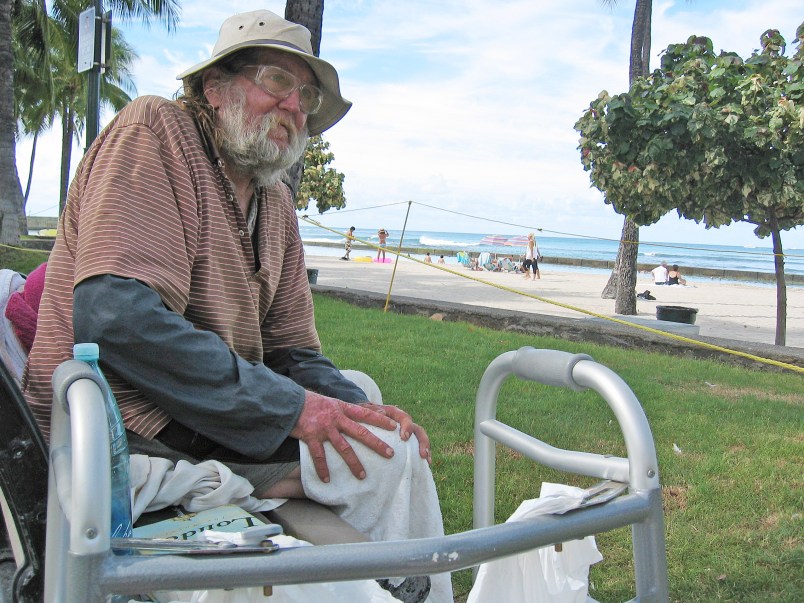HONOLULU (AP) — Jim Trevarthen used to teach tourists how to surf on Hawaii’s famed Waikiki Beach.
These days Trevarthen, 62, is homeless after his Waikiki landlord canceled his lease and jacked up the rent, he said. He spends his days reading surfside and figuring out where he’s going to get his next meal, and his nights finding a safe place to rest where he won’t be shooed away by police.
Trevarthen is one of Hawaii’s many homeless people who live on the shores of paradise, but he’s feeling the impact of the city’s ramped up efforts to move its homeless population away from its tourist meccas.
Under pressure from the visitor industry, the Honolulu City Council is taking up a slew of proposals to ban sitting, lying down, defecating and urinating on sidewalks in Waikiki and other public places.
In another proposal, the city may allow its homeless population to camp on Sand Island, a remote, mostly industrial island far from resorts that was used during World War II as a an Internment Camp for Japanese Americans and is home to a wastewater treatment plant and former dump.
“We are pushing to make it illegal to sleep on the sidewalks of Waikiki, because we’ve heard from our hotel industry that it’s very concerned about keeping Waikiki as an attractive visitor destination,” said Jesse Broder Van Dyke, spokesman for Mayor Kirk Caldwell.
Tourism officials say visitors are complaining about the islands’ homeless population, warning that they may not return for another vacation.
Caldwell gets several letters every week from tourists, especially from Asia, who write to complain about interactions they had with Hawaii’s homeless population, Broder Van Dyke said. The complaints range from seeing someone urinate in public to being upset after an intoxicated person confronted a family.
“Waikiki has seen an influx of homeless individuals who sit and lie on the sidewalks making it difficult for pedestrians to walk on the sidewalk or access businesses, which can create an unsafe and uninviting situation,” said Mike McCartney, president and CEO of the Hawaii Tourism Authority, in testimony to the Council.
Homeless people in Waikiki say if the proposals are passed it won’t alter their lives very much, because they’re already often cited for camping out, racking up tickets they can’t afford to pay.
“They’re trying to harass everyone, and they’re doing a pretty good job of it,” Trevarthen said.
Caldwell’s administration is working to implement Housing First, a program that will provide permanent housing units for chronically homeless individuals throughout the island of Oahu, aiming to house people in the communities where they reside.
But while $45 million for the program has been approved, it will be about a year before individuals can be moved into permanent housing, Broder Van Dyke said. That’s why the city is putting together the temporary “Housing First Transition Center” on Sand Island, which will be operational for one to three years, he said.
At the vacant lot far from hotels and resorts, the city will provide overnight security, mobile bathrooms and a shuttle bus so campers can connect with the island’s public bus system.
Banning sitting and lying on sidewalks goes against a Hawaiian tradition encouraged by King Kamehameha I, who encouraged islanders to lie by the roadside without fear of harm, said Bishop Stephen Randolph Sykes, president of The Interfaith Alliance Hawaii.
“We recognize Waikiki is our economic engine, and having our homeless there is not something that is necessarily beneficial,” Sykes said, “but creating an island-wide type of situation where we’re criminalizing homelessness is just not ‘pono,’ it’s not ethical, because these people don’t have any place to go, and we’re just pushing them around.”
Copyright 2014 The Associated Press. All rights reserved. This material may not be published, broadcast, rewritten or redistributed.







Why do people have to be homeless. Tucker Carlson isn’t
-Somebody writing for Tucker Carlson. Not Tucker Carlson. A friend of a not close friend of Tucker Carlson or maybe Louie Gohmert.